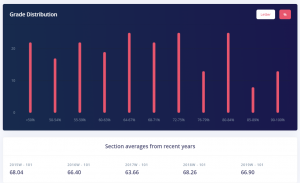Most Science students have heard about the dreaded CHEM 233, but did you know that Chemistry/Biochemistry majors actually aren’t allowed to take that course? Meet CHEM 203, the introductory organic chemistry course that is much more difficult and intensive compared to CHEM 233. However, if you’re really interested in organic chemistry, this course will build solid fundamentals for you to utilize in advanced courses.
FORMAT OF THE COURSE
The format of the course is fairly standard for a typical organic chemistry class. There are live lectures where the professor goes over the details of a reaction and its mechanisms. One really needs to brush up on CHEM 123 knowledge as you’ll be swamped with numerous reactions that need to be memorized on as early as the second week. There are also no slides, as this would be hard to do with a drawing-intensive course such as organic chemistry. The professor writes real-time notes as he talks over reactions, which makes for very organized and structured note-taking.
Along with a lecture portion, there is also a lab portion worth 25% of your entire grade. Surprisingly, these labs had less of a workload than the first year labs. However, instead of labs once every two weeks, you have labs once a week. Unlike the first year labs, there are no unreasonable 10 minute quizzes! In fact, you won’t even have to write any lab reports! The workload consists of pre-lab work, the lab, and post-lab work (which is just filling in a report sheet). Pre-lab and post-lab work usually took me 2 hours a week to accomplish, mostly because I get distracted easily. Unfortunately, your technique mark is largely dependent on your TA. Personally, I had a really bad experience with my TA where it got to the point that I would dread every lab and be too afraid to ask questions (as he would take off marks for any questions he deemed “dumb”). This being said, the lab instructor for this course is very considerate, and would give back marks that were not supposed to be lost (interestingly everyone who had my TA was scaled up in the end…).
GPA 🙂 OR 🙁
This course will tank your GPA unless you have a strong interest in the subject material. There were basically no “free marks” in the course (eg. clickers, participation) as the marks were distributed between two midterms, the lab, and the final exam. All of the examinations were difficult, with averages hovering at mid to high 60s. The final exam average is unknown, but I remember not being able to finish the exam because of length and difficulty. The course was definitely scaled up in the end as I ended up with an A+, despite not being able to finish. The course average for my year ended up being 68.

Credits: ubcgrades.com
verdict? to take or not to take
If you’re not passionate about organic chemistry and you’re not planning on taking any organic chemistry classes in the future I would opt to take the easier CHEM 233 course. If you’re planning on taking more organic chemistry in the future, I 100% recommend taking this course. Even though it is much harder than CHEM 233, you will gain much more solid fundamentals and this will benefit you as your academic career progresses.
